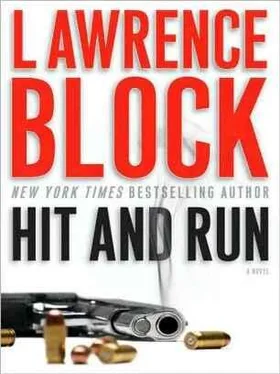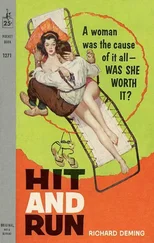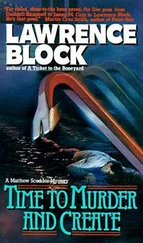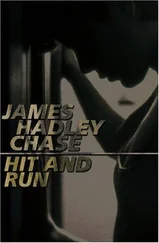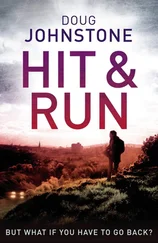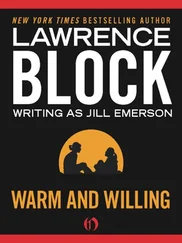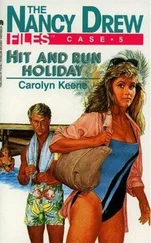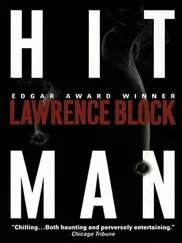And if someone showed up at daybreak to show the house? Or if some neighbor with a place farther along on the dirt road noticed his car as he drove by?
He drove instead to the barn, and parked his car where it wouldn’t be seen. He shared the barn with an owl, who made more noise than he did, and some unidentifiable rodents, who made as little noise as possible, as intent on avoiding the owl as he was on avoiding human beings. The place smelled of animals and hay mold and other less definable barn odors, but he figured he was a long ways away from the nearest human, and that was worth something. He spread some straw around, smoothed it out, and stretched out on it, and he wound up getting a good night’s sleep for his troubles.
On his way out the next morning he went and had a look at the Ford. The wheels were off, as he’d noted earlier, and somebody had pulled the engine, but the old car still sported a pair of license plates. TENNESSEE / THE VOLUNTEER STATE, he read, and there didn’t seem to be anything on the plate to indicate the year. Rust made one of the bolts hard to turn, but he kept at it, and when he drove out of there the Sentra had Tennessee tags, and his Iowa plates were tucked out of sight under some straw in a corner of the barn.
The motel he found outside of Jackson had a sign on the counter indicating that one Sanjit Patel was its proprietor, but evidently this particular Patel had raised himself to that level of the American dream where he could hire people outside his family, and even outside his tribe. The young man behind the counter was a light-skinned African-American whose name tag identified him as Aaron Wheldon. He had a long oval face and short hair, wore glasses with heavy black rims, and beamed at Keller’s approach, showing a lot of teeth. “Bart Simpson! My main man!”
Keller smiled in return, asked the price of a room, learned it was $49. He put three twenties on the counter and pushed the proffered registration card an inch or so toward the young man. “Maybe you could fill this out for me,” he said. After a pause he added, “I wouldn’t need a receipt.”
Wheldon’s eyes were thoughtful behind the thick lenses. Then he smiled broadly again and handed over a room key and a ten-dollar bill. With tax the room ought to come to something like $53, Keller knew, but ten dollars change struck him as a good compromise, because the state of Mississippi wouldn’t see the tax, anymore than Sanjit Patel would see any of the fifty dollars.
“And I misspoke,” Wheldon said, “saying Bart Simpson when anybody can see that’s his daddy Homer on your cap. Y’all have a nice evening, Mr. Simpson.”
Sure, and I never saw you, sir.
In the room, he turned on the TV and switched channels until he found CNN, and as usual he watched half an hour’s worth of news before checking to see what else was available. And in the morning he found a coin box and bought a newspaper.
On his way south through Pennsylvania, he’d been able to pick up the New York Times , and he read a second story about the White Plains fire, this one informing him that the identification of charred remains as the body of Dorothea Harbison had been confirmed through dental records. That ended a hope he’d barely allowed himself to entertain, that somehow the body could have been that of someone else.
As the days passed, Keller kept buying the paper — USA Today on weekdays, whatever else he could find on the weekend. The coverage of the assassination and its aftermath seemed to fade and shrink right in front of him. Years ago Keller had developed a mental mechanism for coping with the reality of his work, picturing his victim, then leaching the color out of the image in his mind, turning it to a black-and-white picture. A series of further steps softened its focus and backed away from it, making it look smaller and smaller until it was nothing but a gray dot that winked and was gone. The technique was effective but not permanent — years later, a person he’d worked hard to forget might suddenly pop up in his mind, life-size and in color — but it had got him through some potentially difficult times, and now he saw that all he’d done was anticipate reality. Because time, unassisted by human will, did much the same thing on its own, as stories bloomed and faded from the news, their visibility diminished by some new outrage that burst out alongside them and replaced them entirely as objects of human interest.
It happened in the media, and when he thought about it he realized it happened much the same way in one’s own consciousness, without effort and even in spite of effort. Things faded, blurred, lost their focus — or simply came to mind less frequently, and with less force.
He didn’t have to search for an example. Some years ago he’d owned a dog, a fine Australian cattle dog named Nelson, and he’d arranged for a young woman named Andria to walk it for him. One thing had led to another, until he and Andria had come to share far more than Nelson’s leash. He’d cared for her, and bought her a great many pairs of earrings, and then one day she left, and took the dog with her.
It was the sort of thing you had to accept, and so he’d accepted it, but it had wounded him profoundly, and there was never a day that he didn’t think about Nelson, and about Andria.
Until one day he didn’t.
And it was not as though it was suddenly over forever, and that neither the girl nor the dog ever came to mind again. Of course they did, both of them, and when they did he felt the same emotions he’d felt that first day, and had felt even more acutely a day later when the shock wore off. But the thoughts came less and less frequently, and the emotional charge that accompanied them grew less and less powerful, until the day came when those twin losses, while never forgotten, were just a part of his own long and curious history.
But why dig them up now as an example? He didn’t have to look that far in the past. Just over a week ago he’d suffered the two greatest losses of his life in the course of a single day. His best friend was killed and his stamp collection was stolen, and he thought about them all the time, and yet already he could see that the thoughts were coming less frequently, and that each day they lost a little of their immediacy and began to find their way into the past. They still filled him with pain and regret, they still burned like acid, but each day he lived with them he got a little further away from them.
So it turned out you didn’t have to forget things, not really. You just relaxed your grip on them and they floated off all by themselves.
Driving around New Orleans, looking for evidence of the devastation caused by Hurricane Katrina, he felt like one of the tourists walking around New York in the aftermath of 9/11, asking passersby how to get to Ground Zero. He’d seen the news coverage, knew how the winds and flooding had kicked the crap out of the city, but he didn’t know his way around the place and couldn’t tell what he was looking at. There were whole neighborhoods ruined, parts of the city that would never be the same, but he was uncertain where they were and unwilling to ask directions.
Besides, why look at blight? He’d been to Ground Zero as a volunteer, dishing out food to rescue workers, but he hadn’t felt the need to return since then to stare at a hole in the ground. He wasn’t about to pick up a hammer and help rebuild New Orleans, and wouldn’t even be staying long enough to watch others rebuild it, so why stand around slack-jawed, gawking at the wreckage?
He drove around, found a neighborhood that looked interesting, and parked the car right on the street. There were no signs saying you couldn’t, and no meters to feed. He tried to decide between the blazer and the denim jacket. It was too warm out for either, so he tugged his T-shirt out of his pants and arranged it to conceal the gun. It didn’t really work, it was too snug and he was sure a person could see the gun’s outline through it, and did he really need to walk around packing a pistol? He stashed the gun in the glove compartment, locked the car, and went off to see New Orleans.
Читать дальше
